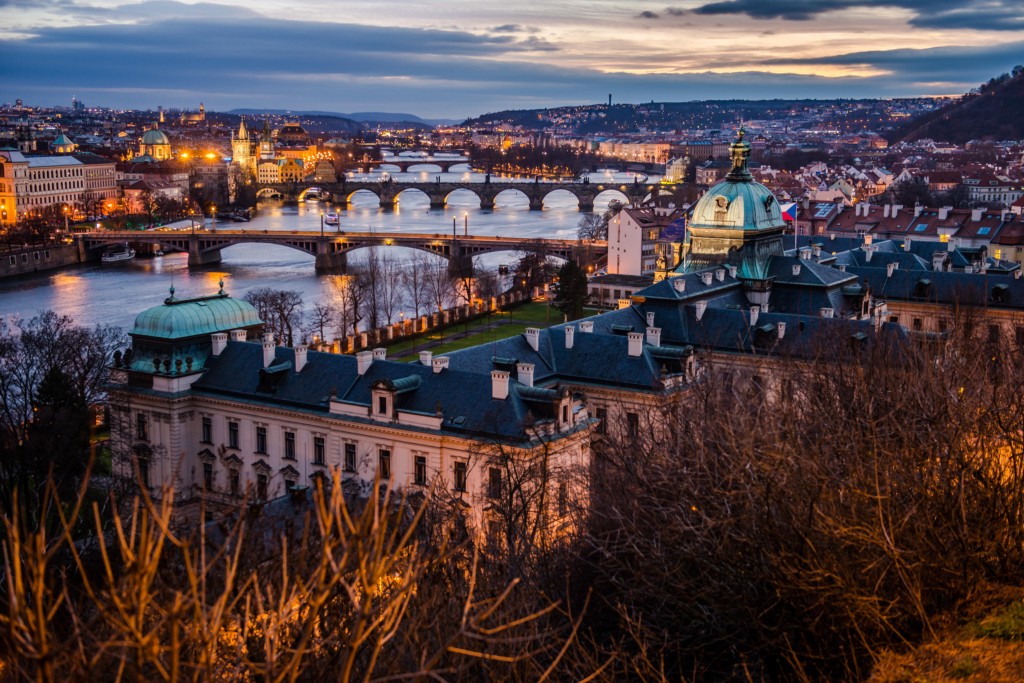Smetana's 'Moldau' Invites You To A Permanent Christmas
Classical Music Hour with Fran

Five years ago this winter, I spent Christmas (and a fraction of Hanukkah) in Prague. I was studying abroad at the time in London, but took my extended holiday break to jump around central Europe rather than go home. There’s nothing particularly remarkable about this; five years just feels like an oddly significant amount of time. I haven’t been back since, so Prague remains, in my head, this beacon of snow and Christmas markets and fried baked goods. Our hostel was located right on the river that runs through Prague, the Vltava, and every day we’d walk along the riverside into the central part of the city to explore something new.
Because it’s nearly the holidays, and because as I’m writing this Chicago is getting its first snowfall, I want to go back a little, both in time and to the Czech Republic, where I started this column with Dvořák. This week, I want to tell you about Bedřich Smetana (an amazing name, truly, perhaps the best name I’ve typed so far), a Czech composer who predates Dvořák by about twenty years.
It’s perhaps easiest to think of Smetana as like the Czech version of Beethoven: he was a prodigy at a very young age who rewrote the pre-existing classical rulebook and also went tragically deaf in the latter half of his career. Let’s unpack this a little. By “prodigy,” I mean: he started composing at the age of 6. (Honestly messed up if you think about what you were doing at the age of 6; I was learning to Rollerblade.) By “rewrote the pre-existing classical rulebook,” I mean that unlike composers who came before him, Smetana, like Saint-Saëns in a way, was less interested in composing symphonies based on variations on a theme, so much as he was operas and tone poems. And by “went tragically deaf in the latter half of his career,” I mean :(.
The “Moldau” is the second movement in Smetana’s set of symphonic poems known as Má Vlast, which translates to My Homeland, and of all the six movements, the “Moldau” itself is the most famous by a wide margin. (I prefer the 2001 Berlin Philharmonic recording, which, interestingly enough, pairs it with Dvořák’s Symphony From The New World.) Má Vlast was written as a celebration of all things Czech, ranging from landscapes and nature and architecture to history and myth and nationalism. In Czech, the “Moldau” is known simply as “Vltava,” like the river I used to walk along in Prague.
The “Moldau” is also peak woodland nymph. We’ve got flute and harp and oboe all up in here. The whole thing is lush and calm and flowing — it really does feel like listening to a river. It starts coyly: a flute solo, pizzicato strings. It beckons you into the universe it’s setting up, namely the Vltava. It should speak to the general soothing nature of the “Moldau” that there’s a triangle part (I hate triangle!!!) I actually love, perhaps because it feels as though it’s hidden in plain sight.
The core melody of the piece doesn’t come in until the 0:55 mark, a little louder and more confident. Throughout the rest of the eleven-minute “Moldau,” the theme comes back, each time a little bolder and more forceful. At the 7:19 mark, it’s confidently backed up by the horns. In the final two minutes of the piece, what felt like little more than a whisper at the beginning has gone full fanfare. Don’t be mistaken: despite a loud and triumphant ending, it’s one of the most relaxing pieces there is. Is it weird to applaud the nature of a river? The end of the piece welcomes the Vltava to Prague, where it flows calmly under the historic King Charles Bridge. It’s crazy to be like, wow, I am now generally enthused about Czech river culture, but that’s what the “Moldau” will do for you.
Even as it builds, the “Moldau” keeps to its smooth, airy melody. It’s a tone poem, after all, and it’s versatile enough to feel suitable for any number of winter activities, like locking yourself in at home when the windchill is bad to trudging through the snow in the wrong boots to tuning out everyone else at a department store while you look at food processors for your parents. It feels naturally uplifting — it doesn’t have to work to get there — in the way that we want the holidays to make us feel. I’m aware of how I sound when I say this, but there’s a magic to the “Moldau.”
So no, it’s not religiously affiliated or particularly holiday-inspired, but there’s something inherently wintery and playful about the “Moldau.” It’s hard not to feel sentimental about something while listening to this, be it your own self-guided study abroad vacation or building a bad snowman or just knowing that you’re going to get a couple of days off from work.
Fran Hoepfner is a writer from Chicago. You can find a corresponding playlist for all of the pieces discussed in this column here.
